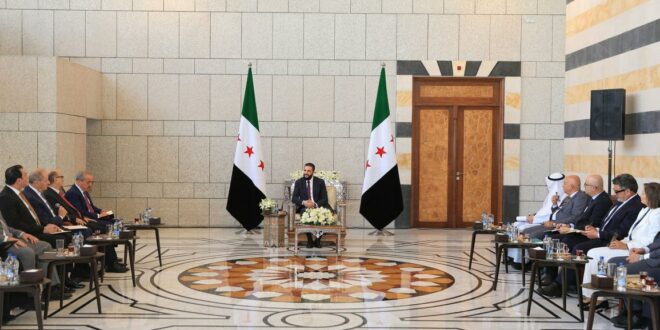In a recent gathering with Arab media in Damascus, President Ahmed Sharaa presented a vivid account of Syria’s current landscape, interweaving the country’s domestic complexities with aspirations for renewal. His vision is of a state reclaiming its institutions, a nation devoid of expansionist ambitions, and a society poised for revival after a decade of destruction and prolonged authoritarianism. Sharaa envisions a Syria its citizens can be proud of—a country that greets its neighbours without suspicion or ulterior motives. His foreign policy, he stressed, is rooted in “shared interests that must guide our path forward.”
During the media briefing last Sunday, Sharaa reflected on Syria’s past and present tribulations, yet refused to be held captive by history. He distanced himself from rigid ideologies, rejected any affiliation with the Muslim Brotherhood, and dismissed enthusiasm for the Arab Spring, declaring that chapter closed. In his inaugural address to the Syrian people and the international community, he stated: “The revolution is over.” Nevertheless, he acknowledged the evolution of his political journey, noting: “We fought alongside Iraqis against the 2004 occupation, only to be labelled terrorists while they were seen as national resistance. I never harmed an Iraqi.” Today, he expressed admiration for Iraqi Prime Minister Mohammed Shia’ Al-Sudani’s approach—eschewing ideological rigidity, prioritising reconstruction, and supporting Syria’s liberation.
At the People’s Palace—once a symbol of oppression—Sharaa received his guests in a Damascene hall he favours for its Islamic Levantine architecture. There, he articulated his aspirations, concerns, and vision for Syria’s complex terrain. He conveyed clear messages regarding relations with neighbouring countries, the wider international community, and even Israel. He expressed openness to peace negotiations predicated on security guarantees, the return of the Golan Heights, and a condition of non-belligerence. “We must not shy away,” he said. “Peace requires resolve and courage, and we will pursue it openly, guided by Syria’s interests and through consultation.”
The Syria of the Assads is not the Syria of Sharaa. Under the former, the country was ruled through tyranny; under the latter, it is an attempt to recover what was lost—a state built on institutions for all its citizens. Sharaa avoids lofty promises and nostalgic rhetoric. He acknowledges the risks but does not dwell on them, demonstrating a willingness to make bold decisions when necessary. Drawing inspiration from historical figures such as Nur al-Din Zanki and Saladin—leaders who championed Sunni revival, unity, and reconciliation with former enemies—Sharaa sees a Syria filled with opportunity, albeit weighed down by persistent challenges.
He believes the way forward does not begin with resolving issues such as Suweida or relations with the Syrian Democratic Forces (SDF), but with the upcoming elections. Though imperfect due to their novelty and the speed of their organisation, these elections are intended as a foundation for reorganising Syria’s internal affairs, restoring legislative authority, and modernising laws to rebuild the nation. Sharaa is committed to curbing the reliance on presidential decrees—a practice long criticised.
On Suweida, Sharaa admitted that all parties bear responsibility, noting that “a wound exists today.” While efforts to mend it are ongoing, he sees no merit in foreign interventions or separatist aspirations, which he considers unrealistic and destabilising in a region inherently bound by national unity. He paid tribute to the patriotic legacy of the Druze community, highlighting the role of tribal values in preserving security, upholding noble principles, and fostering unity under the law.
Where the Assads ruled through a tightly knit gang serving a tyrant, Sharaa’s Syria is an attempt to regain lost ground, build an inclusive state, and pursue development through global cooperation. Acknowledging the burden of longstanding sanctions—some dating back to 1979—he underscored the urgency of modernising state institutions and investing in public services. However, he warned against reckless privatisation, voicing concern over exploitation in a country viewed as ripe for investment.
For Sharaa, Syria must chart its future from the realities of the present, not the weight of the past. He highlighted geography’s dual role as both constraint and opportunity—placing Syrians on historic trade routes like the Silk Road and ancient pilgrimage paths. “Traders thrive on peace and stability,” he remarked, adding that peace is harder to secure than war, which can be ignited by the careless or imposed by force. Quoting Nasr ibn Sayyar’s letter to the Umayyad Caliph Marwan ibn Muhammad, he observed: “War begins with words, but its fire is kindled by actions.” Citing the poet Zuhayr ibn Abi Salma, he warned of war’s toll: “It grinds you like a millstone, leaving only absence.”
To move beyond the scars of conflict, Sharaa advocates forgiveness. Speaking of Lebanon, he said: “I chose reconciliation; there should be no river of fire between us.” He rejected prior interventions and emphasised mutual respect: “I don’t want Lebanese to see me as the elder brother.” Syria’s relations with Iraq, Turkey, Jordan—praised as a balanced and influential regional actor—Qatar, Saudi Arabia, the UAE, and even Russia, he said, are anchored in mutual benefit and stability.
Addressing the threat of ISIS, Sharaa acknowledged its exploitation by various actors, while also recognising past injustices against Kurds, whom he views as equal citizens. Efforts are underway to address these grievances, with agreements with the SDF framed as a national priority. Syria, in his vision, is a country looking ahead—unencumbered by vengeance. He dismissed the revolutionary experiments of the past century as failures, focusing instead on localised solutions, transparency, and the restoration of public trust through concrete progress—in the security sector, infrastructure, and governance.
Sharaa sleeps little—a luxury lost to time. Yet, there is a growing sense of improvement among Syrians. Criticism is now heard openly—in taxis, cafés—accompanied by hope for a new era: a nation worthy of its people’s sacrifices, resilience, and the memory of its martyrs. The longing for news of the missing remains, tempered by a shared aspiration for a state that honours its past while building its future.
 Eurasia Press & News
Eurasia Press & News




